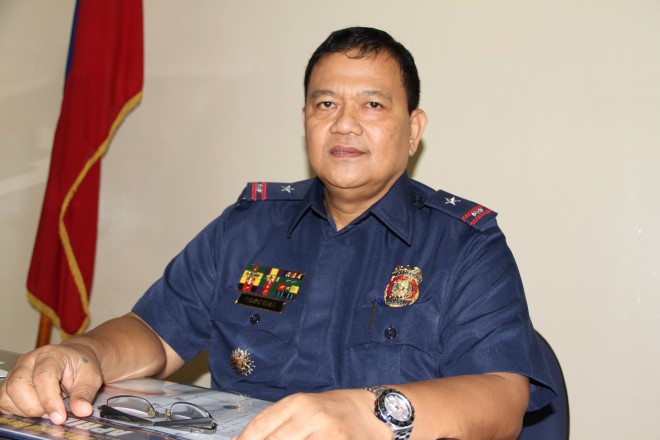Southern Mindanao top cop Wency Pascual retires; recounts life, job experiences

Retired Chief Supt. Wency Pascual: Life is so sacred it should not be wasted. Photo by DENNIS J. SANTOS/INQUIRER MINDANAO
DAVAO CITY—“Sir, dapa (Sir, fall to the ground),” the police aide shouted in terror after a grenade hurled by a man lurking in the dark landed at the center of their dinner table.
A small boy, a son of another policeman, thought the explosive was a toy so he got hold of it.
“I could not move or react immediately as my gaze was at the boy holding the grenade,” said Chief Supt. Wency Pascual, who recounted the incident that took place in Leyte when he was still a young officer.
It was fortunate that it did not explode, said Pascual, director of the Philippine National Police (PNP) in Southern Mindanao who retired from service on May 28, 2014, when he turned 56.
Pascual still vividly remembers the attack, though it happened a long time ago, when he was 22 years old, and a lieutenant who had just graduated from the Philippine Military Academy in 1981.
The incident has taught him one valuable lesson: life is so sacred it should not be wasted. “It changed me. I was having sleepless nights. Then I told my junior officers, wait a minute, wait a minute. Maybe it’s about time we should go back to praying and go to church,” he said.
He said his habit of going around Leyte then without any firearms had proven to be beneficial “and may have even played a vital role why he has remained alive to this day.”
One day, Pascual recounted, he met a rebel leader known as Ka Aris during an occasion related to the peace talks then being held with the communists. He had been helping hunt the rebel down.
The officer asked him: “How come you did not shoot me when we were after you?” Ka Aris just replied with a smile.
It was only later that he realized that without a firearm, he appeared to be a man of peace.
Pascual is a native of San Jose City in Nueva Ecija and the eldest in a brood of four. He said his parents were civil servants and he looked up to them as an example, which was why he took up agriculture in college.
It was in his second year when a friend invited him to take the PMA examination.
Pascual said his parents supported his decision to enter the military academy. No one in the family was a policeman or a soldier.
After graduating from the PMA, Pascual joined the Philippine Constabulary and was assigned in Leyte, where he had several brushes with death. He made Leyte his second home, even spending three years straight without seeing his family in Luzon.
In 1987, he met Nora, who was then with the National Food Authority. After they got married, they made Tacloban City their home.
When the PC was abolished, Pascual joined the Philippine National Police. When he was assigned to Camp Crame’s intelligence division unit, he brought his wife and their only child Reena to Metro Manila.
With his new job, Pascual was instrumental in the arrest of various criminals. In 2003, he was promoted to senior superintendent and named station commander in Parañaque city. He would later hold various positions in the PNP.
In 2013, he was named chief superintendent and was appointed executive officer of the Directorate for Information and Communication Technology Management (DICTM) in Camp Crame. “I was struggling to know everything as Internet technology is very new to me,” he said.
In August of 2013, he became police director of Southern Mindanao, describing the place as a “totally new landscape” as he had never been to Mindanao. “My impression before was that it was a dangerous assignment because it is Mindanao, but I found the opposite,” he said.
As regional director, Pascual said he had headaches—from the people who never targeted him as a police official. He drew inspiration from those who were very supportive of law enforcers, including Mayor Rodrigo Duterte of Davao City.
On the day of his retirement, Pascual said he planned to go on a two-month vacation. But he said he would try to find new work.
“I can’t imagine myself not having a job so I’ll probably go back to my hometown in Nueva Ecija and probably do some farming,” he said.
His parting words to his police force? “Just to do your job to secure peace and order, take care of our profession and don’t be tempted to do bad things.”














